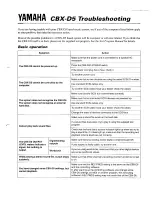
D15107.05
Codec SX80 API Reference Guide TC7.3, OCTOBER 2015.
Copyright © 2015 Cisco Systems, Inc. All rights reserved.
134
Cisco TelePresence SX80
API Reference Guide
xCommand Video Layout AssignLocalOutput
Assign an existing layout to a local output. The defined video composition appears on the specified
local output.
LayoutId: A unique identifier for the layout, which was created when the xCommand Video Layout
Add command was issued.
OutputId: A unique identifier for the local output, which was created when the xCommand Audio
LocalOutput Add command was issued.
Requires user role:
ADMIN
Parameters:
LayoutId(r): <1..2147483647>
OutputId(r): <0..65534>
Example:
xCom mand Video Layout AssignLocalOutput OutputId:1 LayoutId:2
xCommand Video Layout AssignPresentation
Assign the presentation layout (dual stream) to the remote output. The defined video composition
appears on the remote dual video stream.
LayoutId: A unique identifier for the layout, which was created when the xCommand Video Layout
Add command was issued.
Requires user role:
ADMIN
Parameters:
LayoutId(r): <1..2147483647>
Example:
xCom mand Video Layout AssignPresentation LayoutId:2
xCommand Video Layout Frame Add
Add a Video frame to an existing layout. Returns the FrameId. Select size and position of the frame,
and the video source to be shown in the frame.
LayoutId: A unique identifier for the layout, which was created when the xCommand Video Layout
Add command was issued.
FrameId: A unique identifier of the frame.
PositionX: The top-left X position of the frame.
PositionY: The top-left Y position of the frame.
Width: The width of the frame.
Height: The height of the frame.
Layer: The stacking order of the frames (1-6). Must be unique per frame per layout. Layer 6 is on
top.
Border: Select whether or not the frame should have a border.
VideoSourceType: Select the video source to be used as the content of the frame. The parameter
arguments are explained below:
Graphic: Not in use.
LocalInput: Select one of the local input sources.
LocalMain: Select what is currently the main source on the local side.
LocalPresentation: Select what is currently the default presentation source on the local side.
MostSpeaking: Select the current loudest speaker in the conference.
OtherMain: Select another site in a call. This involves logic in the codec to ensure that a site
does not see itself. You can add several frames with OtherMain. The source and the layout engine
automatically populate the frame content with one of the other sites main video, making sure that
you do not see the same site more than once, nor yourself.
otherMainRemote:Select another remote site in a call. This involves logic in the codec to ensure
that a site does not see itself. You can add several frames with otherMainRemote. The source and
the layout engine automatically populate the frame content with one of the other remote sites main
video, making sure that you do not see the same site more than once, nor yourself.
OwnMain: Select that each site can see its own self-view.
Presentation: Select what is currently the presentation source (there is always only one active
H.239 content in a conference).
RemoteMain: Select the main source of remote site.The CallId must then be specified in the
VideoSourceId parameter.
RemotePresentation: Select the presentation source of remote site. The CallId must then be speci-
fied in the VideoSourceId parameter.
VideoFile: Not in use.
VideoSourceId: A unique identifier of the video source.
If the VideoSourceType is set to RemoteMain the VideoSourceId is the CallId of the remote site.
If the VideoSourceType is set to LocalInput the VideoSourceId is the video input SourceId.
Otherwise set to 1.
Contents
Introduction
About the API
xConfiguration
Appendices
xCommand
xStatus
xCommand
















































